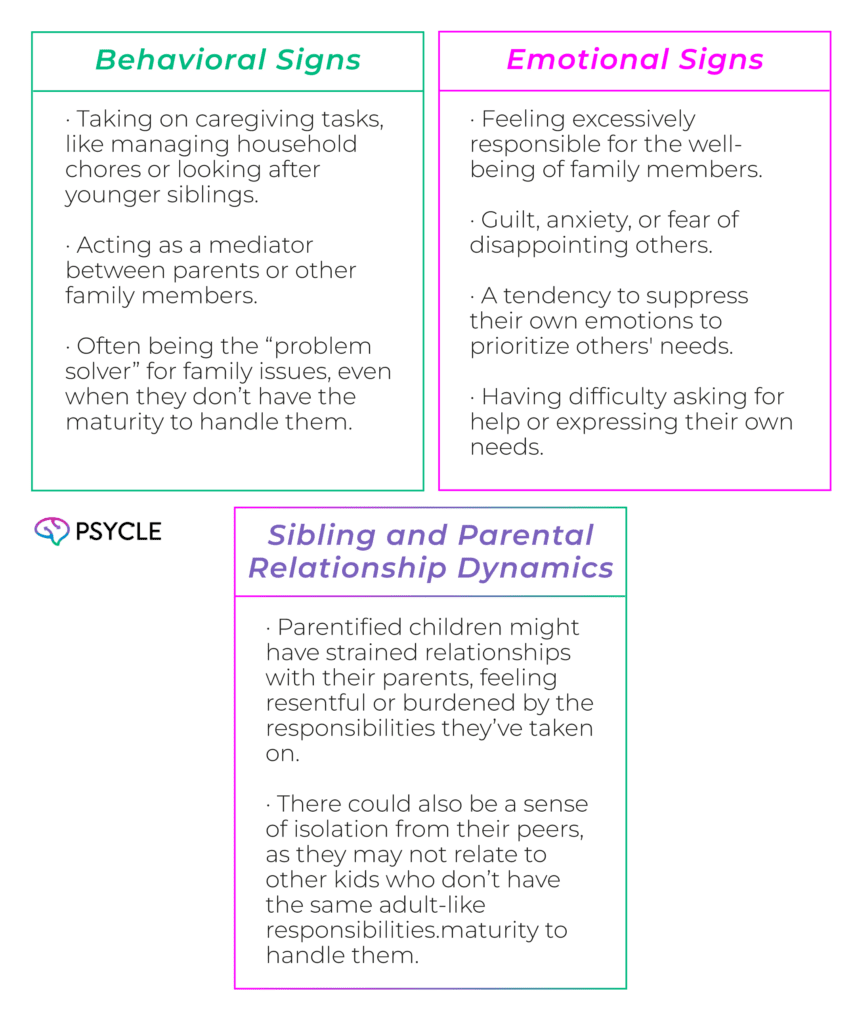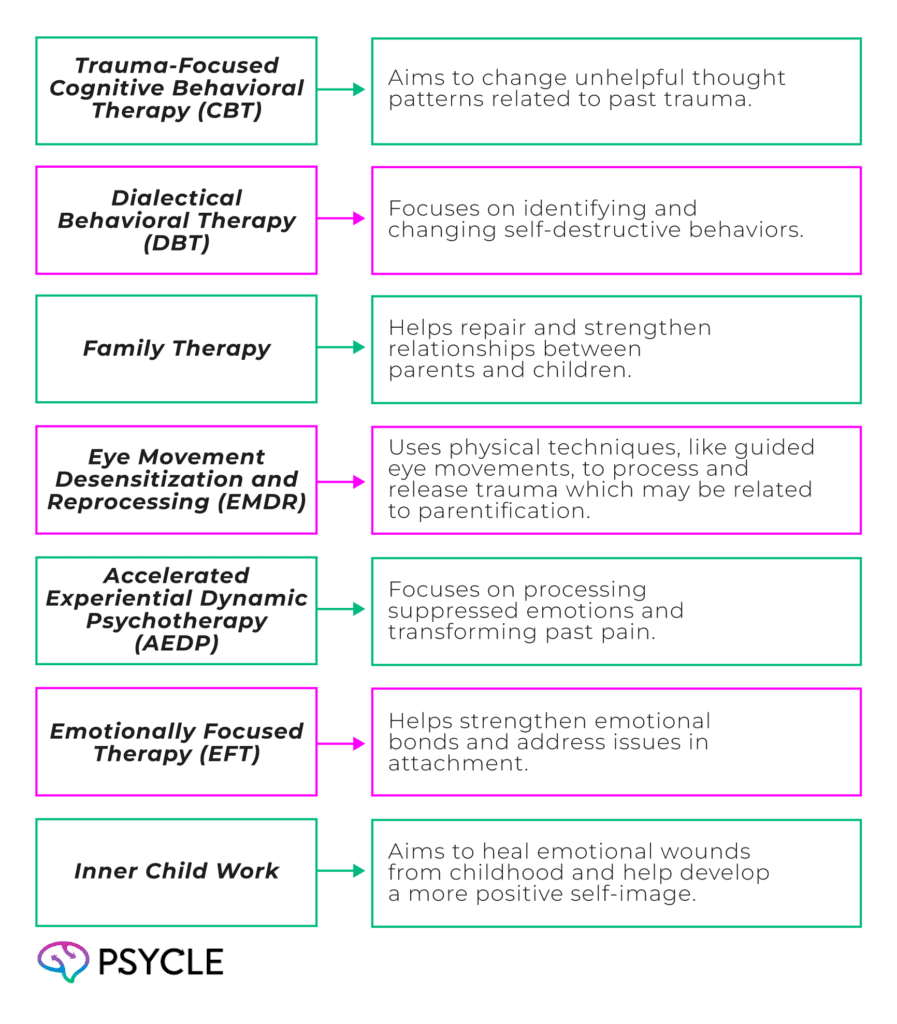Parentification is a term used to describe a situation in which a child takes on roles and responsibilities usually expected of an adult or parent. This can involve both practical and emotional tasks, and it can have lasting effects on the child’s development and adulthood.
In this guide, we’ll explore what defines a parentified child, how it happens, and what it means for both childhood and adult life.
Key Takeaways
- Parentification is when children take on adult-like responsibilities, either practical (e.g., caregiving, household chores) or emotional (e.g., supporting parents emotionally).
- Destructive parentification is harmful and can lead to long-term emotional and developmental consequences, while adaptive parentification may be short-term and necessary due to family circumstances.
- Parentification can arise from parental inability to fulfill their roles, family stress, lack of support, or cultural expectations.
- Parentified children may struggle with mental health issues, social relationships, and academic challenges.
- Breaking the cycle of parentification requires self-awareness, therapy, and self-care practices to heal and prevent passing these patterns to future generations.
What Defines a Parentified Child?
Parentification happens when a child becomes responsible for tasks or emotions that go beyond their age and maturity level. There are two main types of parentification:
- Instrumental Parentification: This involves practical tasks like cooking, cleaning, taking care of younger siblings, or managing household chores.
- Emotional Parentification: Here, the child is expected to provide emotional support for a parent or sibling. This could mean comforting a parent through a difficult time, listening to their problems, or taking on the role of a mediator during family conflicts.
Both types of parentification require a child to take on roles that aren’t appropriate for their developmental stage.
Another distinction in parentification is whether it’s adaptive or destructive.
- Adaptive parentification occurs when a child takes on adult responsibilities out of necessity, for instance, when a parent or sibling is ill.
- Destructive parentification is when a child is continuously expected to take on adult roles. This excessive responsibility can be detrimental to the child’s well-being and development and is considered a form of emotional abuse.
What Causes Parentification?
Several factors can lead to parentification. Here are some of the common causes:
- Parent’s Inability to Fulfill Their Role: When a parent is unable to meet their responsibilities, a child may step in to fill the gap. This can happen for several reasons, including mental health conditions, substance abuse disorders, and chronic illness and disability.
- Family System Stress: When there is a lot of stress in the family, parents can become overwhelmed and may start giving their children responsibilities to help lighten the load. Some common stressors include death in the family, divorce, and migration to a new country.
- Lack of Support: Sometimes, a parent simply doesn’t have sufficient emotional support from other adults. In these cases, the child may be expected to provide the emotional care that a parent would normally receive from their peers or extended family.
- Cultural Factors: In some cultures or communities, it’s normal for children to help with family responsibilities. However, when children are expected to take on too much, it can be harmful. Financial difficulties can also contribute to parentification, as poverty puts stress on the family, often leading to children being expected to work or take on additional duties while parents focus on earning a living.
- Generational Trauma: Parents who experienced parentification or emotional neglect in their childhood may be more likely to repeat these patterns with their own children.
What Are the Signs of Parentification?
There are several signs that a child may be experiencing parentification, both in terms of behavior and emotional state. Some common indicators include:

How Does Parentification Affect Childhood Development?
Research shows that children who take on parentified roles are more likely to experience a wide range of challenges. Psychologist Jennifer Engelhardt conducted a literature review investigating the developmental impact of parentification and found parentification significantly affected children’s emotional, social, and academic development.
Some of these challenges included:
- Mental Health and Behaviour: Parentified children often report internal problems like anxiety, depression, and physical symptoms (such as headaches and stomachaches). They are also at higher risk for outward behaviors, such as aggression, disruptive behavior, and substance use.
- Social and Interpersonal Skills: Because parentified children focus so much on caregiving and taking on adult responsibilities, they often struggle with social relationships. They may have lower competency in forming and maintaining healthy friendships and experience difficulties with trust and emotional connections.
- Academic Challenges: Parentification can also negatively impact a child’s academic performance. These children may have high rates of absenteeism, poor grades, and trouble concentrating in school due to the emotional and practical burdens they carry at home.
The emotional impact of parentification can be especially harmful. When children provide emotional support to their parents, it can affect how they cope with stress and interfere with their emotional growth.
Parentification can have a lasting impact on relationships. Adults who were taught to prioritize others’ emotions over their own as children may struggle to set boundaries later in life. Romantic relationships can be particularly affected, with one study showing that women who experienced parentification reported lower relationship satisfaction.
The emotional consequences of parentification often continue into adulthood. Research shows that parentified children are more likely to experience depression and anxiety later in life. Additionally, difficulties focusing on school as a child and emotional burdens can contribute to higher unemployment rates among parentified individuals.
How to Break the Cycle of Parentification
Breaking the cycle of parentification takes self-awareness, intentional effort, and support. For adults who were parentified as children, it’s crucial to recognize how these patterns show up in their lives. Seeking professional support, like therapy or counseling, can be a powerful way to process past experiences and heal emotional wounds. With this support, individuals can break unhealthy patterns and avoid passing them on to their own children.
Therapy to Heal from Parentification
Healing from parentification can be a long and challenging journey, but it is possible. Therapy is one of the most effective ways to heal, and there are several types of therapy that can be helpful, including:

In addition to therapy, self-care practices play a crucial role in healing from the impacts of parentification. Taking time to focus on one’s own needs and well-being is essential for breaking the cycle and rebuilding a healthier sense of self.
Self-care helps individuals reconnect with themselves, restore balance, and manage the emotional toll of past experiences.
The Importance of Self-Care
Examples of self-care practices include:
- Journaling: Writing down thoughts and feelings can be a therapeutic way to process emotions and gain clarity. It allows individuals to reflect on their experiences and track their progress over time.
- Socializing and Seeking Support: Connecting with friends, family, or support groups provides emotional connection and encouragement. Having a trusted person to talk to can reduce feelings of isolation and foster a sense of belonging.
- Creative Expression: Engaging in creative activities like painting, writing, dancing, or playing music can help release pent-up emotions and promote healing.
- Spending Time in Nature: Taking a walk in the park, hiking, or simply spending time outdoors can have calming effects. Nature has been shown to reduce stress, improve mood, and enhance overall mental clarity.
- Nourishing Your Body: Eating nutritious meals, staying hydrated, and practicing mindful eating help maintain physical health and contribute to mental well-being. It’s important to listen to your body’s hunger cues and nourish it with care.
- Pampering Yourself: Simple activities like taking a warm bath, getting a massage, or treating yourself to a favorite meal can promote relaxation and self-compassion.
FAQs
How Can I Recognize if a Child is Being Parentified?
Parentification in children can be recognized by signs such as taking on caregiving tasks, acting as a mediator in family conflicts, and feeling excessively responsible for family members’ well-being. Emotional signs may include guilt, anxiety, and difficulty expressing their own needs.
What Types of Therapy Are Best to Heal the Effects of Parentification?
Effective therapies for healing from parentification include trauma-focused cognitive behavioral therapy (CBT), dialectical behavioral therapy (DBT), and family therapy. However, each individual has their own trauma and preferences and so will respond differently to different therapy types.
How Can I Prevent Parentification in My Family?
To prevent parentification, ensure that responsibilities are balanced within the family and that children are given age-appropriate tasks. It’s also important to create a supportive environment where parents have access to emotional support and can fulfill their roles without overburdening the children.
Sources
- https://pmc.ncbi.nlm.nih.gov/articles/PMC10341267/
- https://pubmed.ncbi.nlm.nih.gov/38828384/

